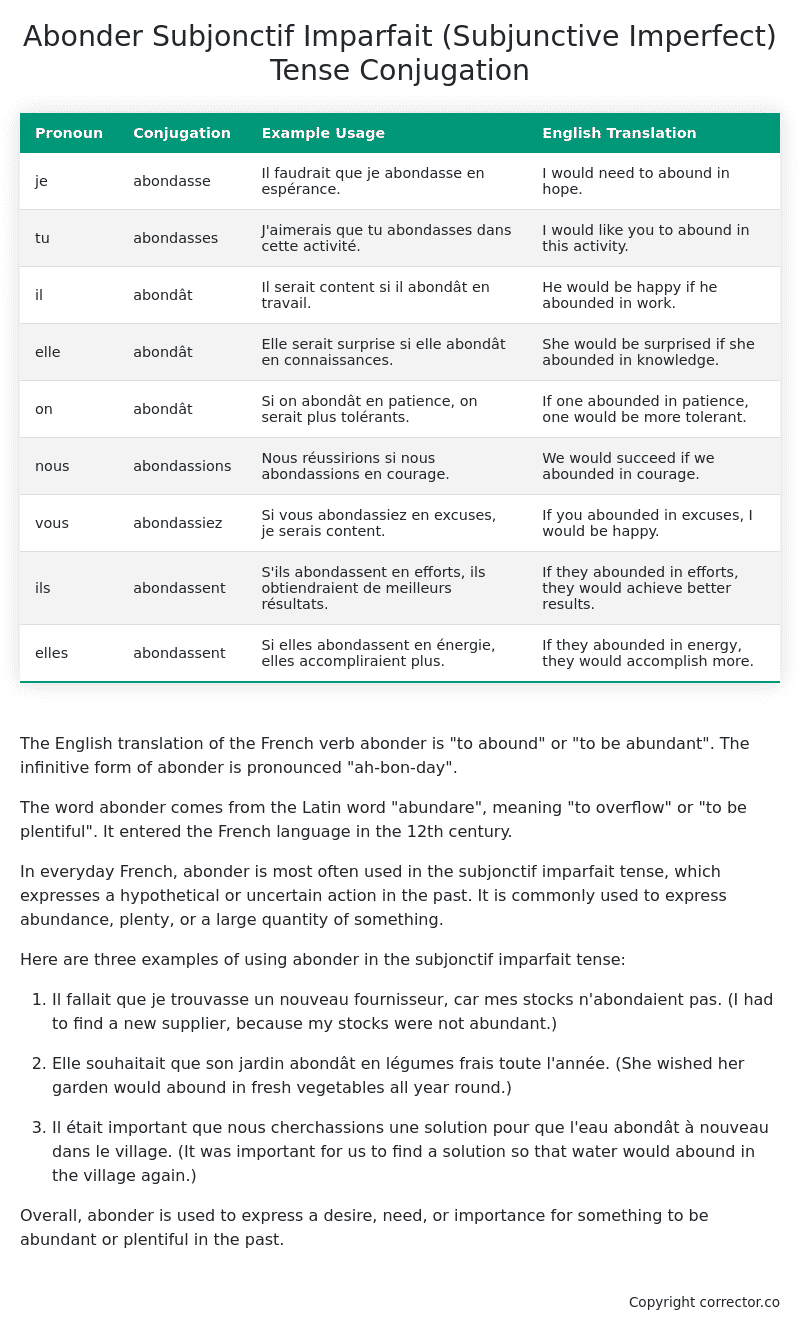Subjonctif Imparfait (Subjunctive Imperfect) Tense Conjugation of the French Verb abonder
Introduction to the verb abonder
The English translation of the French verb abonder is “to abound” or “to be abundant”. The infinitive form of abonder is pronounced “ah-bon-day”.
The word abonder comes from the Latin word “abundare”, meaning “to overflow” or “to be plentiful”. It entered the French language in the 12th century.
In everyday French, abonder is most often used in the subjonctif imparfait tense, which expresses a hypothetical or uncertain action in the past. It is commonly used to express abundance, plenty, or a large quantity of something.
Here are three examples of using abonder in the subjonctif imparfait tense:
-
Il fallait que je trouvasse un nouveau fournisseur, car mes stocks n’abondaient pas. (I had to find a new supplier, because my stocks were not abundant.)
-
Elle souhaitait que son jardin abondât en légumes frais toute l’année. (She wished her garden would abound in fresh vegetables all year round.)
-
Il était important que nous cherchassions une solution pour que l’eau abondât à nouveau dans le village. (It was important for us to find a solution so that water would abound in the village again.)
Overall, abonder is used to express a desire, need, or importance for something to be abundant or plentiful in the past.
Table of the Subjonctif Imparfait (Subjunctive Imperfect) Tense Conjugation of abonder
| Pronoun | Conjugation | Example Usage | English Translation |
|---|---|---|---|
| je | abondasse | Il faudrait que je abondasse en espérance. | I would need to abound in hope. |
| tu | abondasses | J’aimerais que tu abondasses dans cette activité. | I would like you to abound in this activity. |
| il | abondât | Il serait content si il abondât en travail. | He would be happy if he abounded in work. |
| elle | abondât | Elle serait surprise si elle abondât en connaissances. | She would be surprised if she abounded in knowledge. |
| on | abondât | Si on abondât en patience, on serait plus tolérants. | If one abounded in patience, one would be more tolerant. |
| nous | abondassions | Nous réussirions si nous abondassions en courage. | We would succeed if we abounded in courage. |
| vous | abondassiez | Si vous abondassiez en excuses, je serais content. | If you abounded in excuses, I would be happy. |
| ils | abondassent | S’ils abondassent en efforts, ils obtiendraient de meilleurs résultats. | If they abounded in efforts, they would achieve better results. |
| elles | abondassent | Si elles abondassent en énergie, elles accompliraient plus. | If they abounded in energy, they would accomplish more. |
Other Conjugations for Abonder.
Le Present (Present Tense) Conjugation of the French Verb abonder
Imparfait (Imperfect) Tense Conjugation of the French Verb abonder
Passé Simple (Simple Past) Tense Conjugation of the French Verb abonder
Passé Composé (Present Perfect) Tense Conjugation of the French Verb abonder
Futur Simple (Simple Future) Tense Conjugation of the French Verb abonder
Futur Proche (Near Future) Tense Conjugation of the French Verb abonder
Plus-que-parfait (Pluperfect) Tense Conjugation of the French Verb abonder
Passé Antérieur (Past Anterior) Tense Conjugation of the French Verb abonder
Futur Antérieur (Future Anterior) Tense Conjugation of the French Verb abonder
Subjonctif Présent (Subjunctive Present) Tense Conjugation of the French Verb abonder
Subjonctif Passé (Subjunctive Past) Tense Conjugation of the French Verb abonder
Subjonctif Imparfait (Subjunctive Imperfect) Tense Conjugation of the French Verb abonder (this article)
Subjonctif Plus-que-parfait (Subjunctive Pluperfect) Tense Conjugation of the French Verb abonder
Conditionnel Présent (Conditional Present) Tense Conjugation of the French Verb abonder
Conditionnel Passé (Conditional Past) Tense Conjugation of the French Verb abonder
L’impératif Présent (Imperative Present) Tense Conjugation of the French Verb abonder
L’infinitif Présent (Infinitive Present) Tense Conjugation of the French Verb abonder
Struggling with French verbs or the language in general? Why not use our free French Grammar Checker – no registration required!
Get a FREE Download Study Sheet of this Conjugation 🔥
Simply right click the image below, click “save image” and get your free reference for the abonder Subjonctif Imparfait tense conjugation!

Abonder – About the French Subjonctif Imparfait (Subjunctive Imperfect) Tense
Formation
Common Everyday Usage Patterns
Interactions with Other Tenses
Subjonctif Présent
Indicatif Passé Composé
Conditional
Conditional Perfect
Summary
I hope you enjoyed this article on the verb abonder. Still in a learning mood? Check out another TOTALLY random French verb conjugation!


